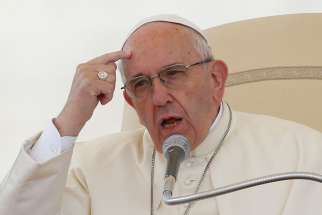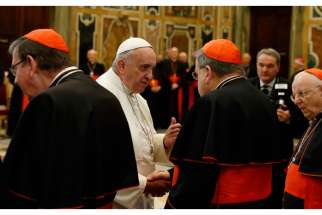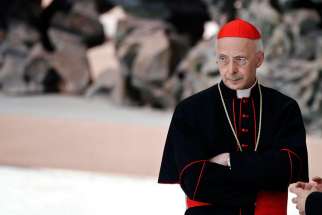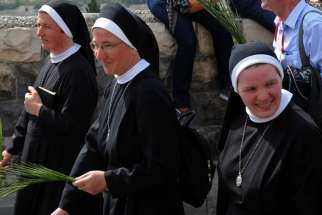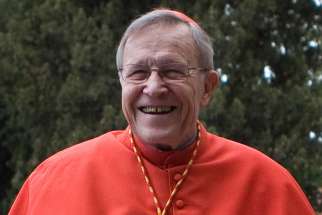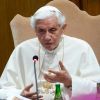Glen Argan: This piece of advice has stuck
When I was a young journalist, I joined the Volunteers, a group associated with the Oblate Missionaries of Mary Immaculate (OMMI), a secular institute, and began to take part in their regular discussion groups. Early on, we discussed the five elements of the OMMI spirituality.
The Holy Spirit strengthens us so that we may bear witness to the Lord even through persecution – even to the point of sacrificing our life. But also through the small persecutions like gossip and criticism. That’s what Pope Francis said Monday at the daily Mass at the Santa Marta guesthouse in the Vatican.
Pope warns Vatican officials of 'spiritual Alzheimer's,' other ills
VATICAN CITY - Pope Francis' Christmas greeting to the Vatican bureaucracy this year was an extended warning against a host of spiritual ills to which he said Vatican officials are prone, including "spiritual Alzheimer's," "existential schizophrenia," publicity-seeking, the "terrorism of gossip" and even a poor sense of humor.
In Christmas message, Jerusalem patriarch criticizes all violence
JERUSALEM - Ending a year that saw the papal visit, a war in Gaza and a resumption of violence in Jerusalem, Latin Patriarch Fouad Twal's Christmas message condemned all instances of violence.
How we react to criticism and opposition
Have you ever noticed how we spontaneously react to a perceived threat? Our primal instincts tend to take over and we instantly freeze and begin to shut all the doors opening to warmth, gentleness and empathy inside us.
The American nuns who were publicly scolded by the Vatican’s top doctrinal official for disobedience and promoting unorthodox beliefs have rejected the criticisms, and say their “attempts to clarify misperceptions have led to deeper misunderstandings” between Rome and the organization representing most of the 50,000 sisters in the U.S.
NEW YORK - The German cardinal who has been called the “Pope’s theologian” said fresh Vatican criticism of American nuns was typical of the “narrower” view that officials of the Roman Curia tend to take, and he said U.S. Catholics shouldn’t be overly concerned.
Pope Benedict recalls Vatican II with praise and criticism
VATICAN CITY - On the eve of the 50th anniversary of the opening of the Second Vatican Council, L'Osservatore Romano, the Vatican newspaper, published a short reminiscence of the council by Pope Benedict XVI.
In the essay, the Pope recalls his presence at the opening of Vatican II, which he attended as a theological adviser. He both praises and criticizes some of the council's most consequential documents, regarding religious liberty and the Church's relationship with non-Christian religions and the modern world.
The essay is the introduction to a forthcoming collection of previously unpublished council-era writings by then-Father Joseph Ratzinger. The collection will be published in German this November.
"It was a moment of extraordinary expectation," the Pope writes of the procession of more than 2,000 bishops into St. Peter's Basilica Oct. 11, 1962. "Great things were about to happen."
"Christianity, which had built and formed the Western world, seemed more and more to be losing its power to shape society," he writes. "So that it might once again be a force to shape the future, (Blessed) John XXIII had convoked the council without indicating to it any specific problems or programs. This was the greatness and at the same time the difficulty of that task that was set before the ecclesial assembly."
A crucial question for the council fathers, Pope Benedict writes, was the "relationship between the Church and the modern world."
"From the 19th century onward," the Church had "visibly entered into a negative relationship with the modern era," he writes. "Did it have to remain so?"
Pope Benedict concludes that one of the council's best-known documents, "Gaudium et Spes," the Pastoral Constitution on the Church in the Modern World, failed to offer an adequate definition of the "essential features that constitute the modern era."
Instead, he writes, the "encounter with the great themes of the modern epoch" happened in "two minor documents, whose importance has only gradually come to light."
The Declaration on Religious Liberty, "urgently requested, and also drafted, by the American bishops in particular," clarified the Church's affirmation of the "freedom to choose and practice religion and the freedom to change it, as fundamental human rights and freedoms," he writes.
That declaration lent itself to troubling interpretations, the Pope writes, since it might seem to imply the "inaccessibility of the truth to man," which would make religion a merely subjective matter. But he writes that the 1978 election of Blessed John Paul II, from a country where the state denied religious freedom, revealed the "inner orientation of the faith toward the theme of freedom, and especially freedom of religion and worship."
The Pope also praises "Nostra Aetate," the council's declaration that the "spiritual, moral, and socio-cultural values (of non-Christian religions) were to be respected, protected and encouraged."
But the Pope writes that a "weakness of this otherwise extraordinary text has gradually emerged: It speaks of religion solely in a positive way, and it disregards the sick and distorted forms of religion."
In conclusion, Pope Benedict reiterates one of his most prominent teachings about Vatican II: that it must be interpreted in continuity with the Church's millennial traditions, not as a radical break with the past.
"The council fathers neither could nor wished to create a new or different Church. They had neither the authority nor the mandate to do so," he writes. "That is why a hermeneutic of rupture is so absurd and is contrary to the spirit and the will of the council fathers."



